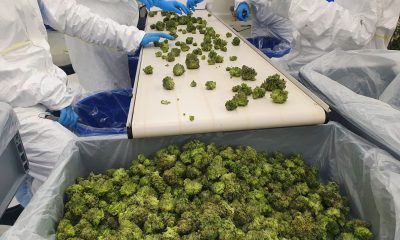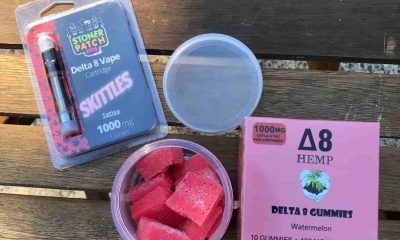Germany today presented the key points (Eckpunkte) of its proposal for the legalization of adult cannabis use in the country. The controlled supply of recreational cannabis to adults over 18 years of age should be based on a 2-pillar model: private and community domestic, non-commercial cultivation; and the regional model project, with commercial supply chains. Self-cultivation of up to 3 plants will be authorized and social clubs of up to 500 members will also be authorized, with the possibility of distributing clones and seeds to members. The limit for purchasing and transporting cannabis flowers is 25 grams per day and 50 grams per month. The THC limit has not yet been defined.
Based on the 2021 coalition agreement, the Federal Government presented the key points for the introduction of controlled sales of cannabis to adults for recreational purposes in licensed stores. According to the document released today by the German government, the objective is "to control quality, prevent the transmission of contaminated substances, guarantee the best possible protection for minors and the health of consumers and curb the illicit market".
As explained in the key points, the federal government also examined and assessed the requirements of European and international law and made it clear in the document that the framework of international and European law must be taken into account when implementing the coalition project. In that context, the federal ministries involved in the cannabis project exchanged views with the European Union Commission in Brussels at the end of 2022 and, in line with technical responsibilities, incorporated their findings into ongoing work and federal government coordination.
The controlled supply of recreational cannabis to adults should be based on a 2-pillar model:
1st pillar: Private and community self-cultivation, non-commercial
- Non-profit associations may, under narrow and clearly defined legal frameworks, jointly grow cannabis for recreational purposes and sell it to members for their own consumption. Members should participate as actively as possible in the association. The participation of employees of associations in cultivation is allowed, however, hiring third parties for cultivation is excluded.
- The framework conditions for manipulation are regulated by law.
- In addition to harvested recreational cannabis, members can also receive sprouted seeds and clones from the association for self-cultivation. It is under consideration whether and how seeds and/or seedlings for private cultivation can be obtained from associations at cost price without association membership being a prerequisite.
- Approval and monitoring are carried out by state authorities regarding compliance with quantitative, qualitative and youth protection requirements and with checks and visits on the spot. Personal data collected by associations in connection with the sale of recreational cannabis, seeds and seedlings to members cannot be transmitted to unauthorized third parties or used for other purposes. Membership in multiple associations is prohibited.
- Fines, deregistration or fines/imprisonment for multiple offenses are possible.
- The cultivated and harvested quantities are aimed at meeting demand. There are reporting and documentation obligations for produced and delivered quantities. There is a ban on the import or export of recreational cannabis.
- Membership fees cover cost price, scaled according to quantity supplied (possibly with a fixed base fee and an additional amount per gram supplied).
- The number of members per association is limited to a maximum of 500 with a minimum age of 18 and domicile or usual residence in Germany. The number of associations may be limited by population density.
- The association can only be administered by natural persons whose suitability has been verified. The association is managed in accordance with the principles of association law. The personal liability of the association's board of directors in the event of financial loss or breach of official requirements shall only arise in the event of willful misconduct or gross negligence.
- Enables the acquisition of seeds for the (first) cultivation in associations. The possibility of importing seeds from third countries is being studied.
- The sale of harvested cannabis (flowers) is only allowed to members; no disclosure to third parties; max. 25g of cannabis per day, max. 50g per month, max. 7 seeds or 5 seedlings per month. The distribution for teenagers under 21 years old is limited to an amount of 30g per month, in addition to a limit for the allowed THC content (limit to be clarified). This should be reflected in variety selection.
- It is being examined whether and how seeds and seedlings can be freely exchanged between associations for quality assurance purposes.
- Quality specifications apply to community growing (in particular the ban on additives or blends such as tobacco or flavorings, pesticide specifications, no synthetic cannabinoids).
- A delivery is only in pure form (flowers or resin) in neutral packaging or released with attached information about the product (variety, including its usual average THC content and content of other cannabinoids like CBD), dosage and application, as well as the risks consumption centers and counseling centres.
- Consumption on the premises of the association is prohibited, as well as public consumption close to schools, kindergartens, etc. and in pedestrian areas until 20:00.
- At the same time, the sale of alcohol, tobacco or other stimulants and intoxicants is prohibited.
- Access is only allowed to adults with a strict age control requirement.
- The conditions for the protection and prevention of minors apply. To be designated by the association: Youth protection, addiction and prevention officers have proven experience; there is obligatory cooperation with the local drug addiction prevention or counseling center and a minimum distance from schools, kindergartens or similar.
- There is a general ban on advertising for associations and for cannabis. Factual information is allowed.
- Minimal protective measures (eg burglar-proof installations, fencing) prevent access by unauthorized third parties.
- Penalty-free possession (carrying in public) is possible for personal consumption up to 25g; There are criminal provisions for possession exceeding this, for trade and sale to non-members and children and young people, as well as for the sale of things not cultivated in the associations themselves.
- Limit values in road, sea and air traffic are verified with the involvement of relevant specialized commissions. Regulations on the permissibility of driving under the influence of cannabis are based exclusively on road safety requirements.
- Non-punishable private cultivation includes a maximum of 3 plants with feminized flowers and must be protected from access by children and young people.
- It will be possible to exclude from the central federal register convictions that were registered exclusively for acts related to cannabis, for which the law no longer foresees penalties in the future (possession of up to 25 g/own cultivation of up to a maximum of 3 plants with feminized flowers ). With the entry into force of the law, ongoing investigations and criminal proceedings relating to these facts will be terminated by the options already provided for in the Code of Criminal Procedure.
- The scope of the Federal Smokeless Protection Act is extended to include the smoking of cannabis-related products; additional protection for non-smokers according to tobacco regulations must be ensured.
- Participation in early intervention and prevention programs for minors in cases of possession or consumption of cannabis is mandatory.
- After 4 years, the Pillar 1 specifications will be evaluated with the aim of examining possible adjustments in relation to health and youth protection, as well as reducing the illicit trade. In addition, the provisions on youth and health protection formulated in the key points document of 26 October 2022 must be implemented. The intention is to design this proposed regulation in such a way that no notification obligation and no Bundesrat approval obligation is triggered.
2nd pillar: Regional model project with commercial supply chains
In the next step on the road to national regulation, the second pillar implements the other approaches in the 26 October 2022 Key Points document, including an assessment as a scientifically designed, regional, and time-bound model: will companies stop production , sales and distribution in stores specializing in recreational cannabis for adults within a government-licensed and controlled structure. With this pillar, the effects of a commercial supply chain on youth health and protection, as well as on the black market, can be scientifically examined.
- The duration of the project is 5 years from the established supply chain.
- There is a geographic restriction for landing places and adult residents of certain Districts/cities in several federal states (approach Opt-in).
- Under the law, the approval of the sale of food is being scrutinized in accordance with strict regulations for the protection of health and youth.
- The model is scientifically monitored and evaluated. Findings are made available to European partners and the EU Commission.
- The protection of health and youth also follows the October 26, 2022 key points document. This part of the draft will likely remain subject to notification.
3. Additional procedure
When implementing the 2-pillar model, the Federal Government uses its international and European legal framework as a basis. It will refer to the declaration of interpretation issued in 1993, when the 1988 UN Convention was ratified to the relevant UN bodies, and will issue a declaration in which it declares that the draft is compatible with the purpose and legal requirements of the Convention. of the UN. In addition, close and transparent coordination with European partners will be important. Federal departments are working on all parts of the project within the scope of their respective responsibilities under the overall leadership of BMG. Both pillars are embodied in concrete draft laws, with the pillar 1 working draft being tabled in early April 2023, followed by the pillar 2 draft bill. Protection of minors in other countries is taken into account in both pillars. At the same time, the Federal Government continues its efforts (especially through diplomatic missions abroad) to promote its approaches to European partners and is also assessing the extent to which the initiative will be possible for a sufficient number of EU member states, in order to comply with the relevant EU legal framework in the medium term, to be more flexible and developed.










































